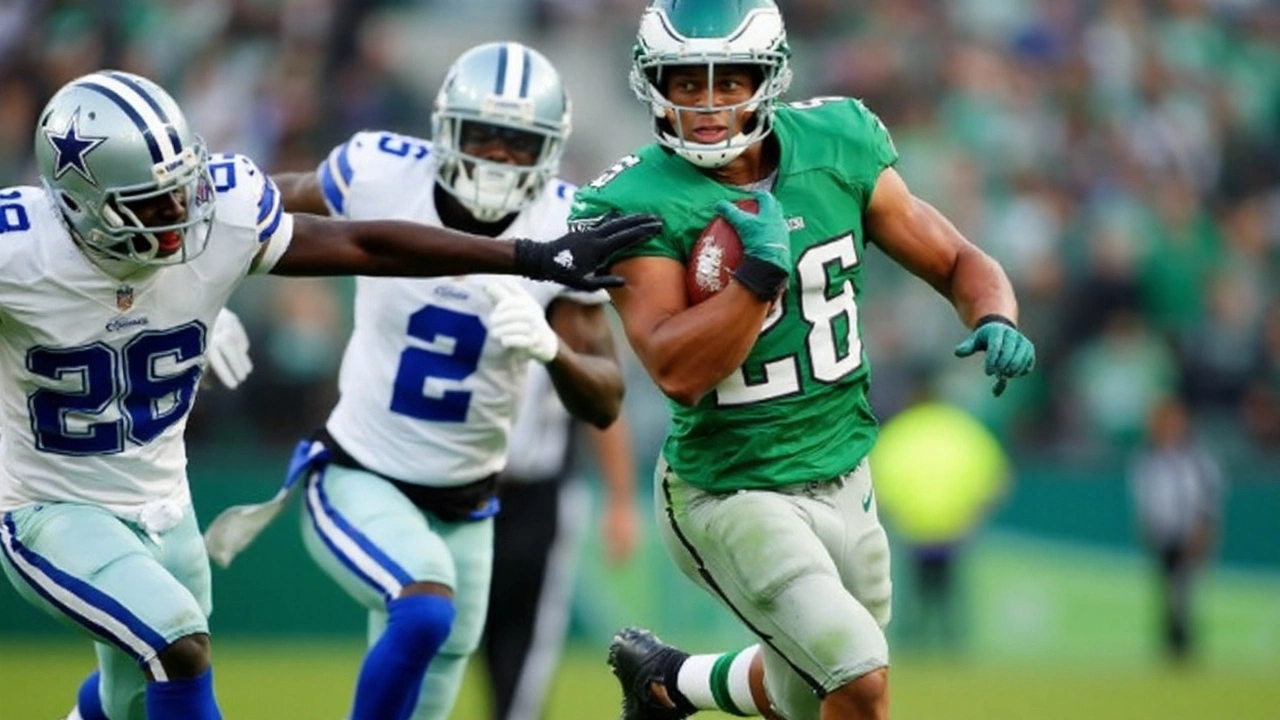Eagles vs Cowboys: Weather Delay, Early Ejection, and a 24-20 Statement Win to Open 2025

- Sep, 5 2025
- 0 Comments
- Kendrick Fairway
A chaotic start, a tight finish
The NFL’s big curtain-raiser had everything you expect from a rivalry game—and a few things you don’t. The defending champions from Philadelphia beat Dallas 24-20 in a stop-start, storm-battered night at Lincoln Financial Field that began with an ejection before the first snap and ended with the Eagles closing out a one-score win. The scoreboard says narrow. The subtext says gritty, patient, and poised.
Weather took control early. Stadium officials followed lightning protocol, clearing parts of the seating bowl and sending both teams back to the locker room. The delay stretched past an hour, forcing players to warm up, cool down, then ramp up again. Athletic trainers juggled hydration plans, coaches tore up scripts, and the TV broadcast filled time while the radar slowly improved.
When play finally resumed, the shock from pregame lingered: Eagles defensive tackle Jalen Carter was tossed before the opening snap after a pre-kickoff incident that drew an unsportsmanlike conduct penalty and the rare ejection for behavior outside live play. That forced Philadelphia to reshuffle its interior rotation on the fly. Credit the Eagles’ front for adjusting its pressure packages and gap integrity without one of its blue-chip disruptors.
Despite the chaos, the football settled into a familiar groove. Jalen Hurts steadied the offense—decisive on early downs, careful with the ball, willing to take singles and doubles until a shot opened up. Dallas countered with a clean plan for Dak Prescott, whose recent history against Philly has been excellent (4–1 since 2021, 16 touchdowns and just one interception entering the night). He worked the underneath throws, kept the chains moving, and waited for coverage busts that never quite materialized.
Two things swung the night. First, the Eagles were better in the red zone, finishing drives that Dallas too often settled as threes. Second, Philadelphia’s offensive line won enough snaps in high leverage—third-and-manageable, backed-up field position, and late-game clock situations—to keep Hurts upright and the game on their terms. The result wasn’t pretty. It was Week 1 tough.
The context made the stakes bigger than a standard opener. This was the first time these NFC East rivals started a season against each other since 2000, when the Eagles blew out Dallas 41-14. This time the margin and tone were different: more trench fight than track meet. With a division race that usually comes down to a game or two, banking a head-to-head win in September matters more than the calendar suggests.
The betting market underscored expectations. According to ESPN BET, Philadelphia closed as an 8.5-point favorite—the largest spread for a defending champion in a kickoff game since Tampa Bay in 2021. The Eagles won but didn’t cover, a neat reminder that rivalry games don’t often follow scripts, especially when lightning sends both teams into a holding pattern.
Dallas won’t take comfort in moral victories, but the Cowboys showed enough to keep every NFC East conversation honest. The pass rush bothered Hurts in stretches, and the coverage limited explosive throws off play-action. Where they fell short: finishing drives, avoiding drive-killing penalties, and stealing a possession. Fix those and the rematch looks very different.
Philadelphia, meanwhile, affirmed identity more than it unveiled anything new. The offense took what the defense gave, leaned on protection and quarterback decision-making, and sprinkled in tempo to test Dallas substitutions after the long delay. On defense, minus Carter, the Eagles mixed simulated pressures and disguise to keep Prescott from clean pre-snap tells. They didn’t dominate, but they forced tough throws to the boundary and tackled well after the catch.
The oddities of the night will linger. An ejection before snap one is vanishingly rare; the league office typically reviews that kind of incident early in the week for potential fines. The delay itself changed body-clock rhythms: long layoff, then sudden intensity as both teams were asked to hit full speed after muscles cooled. It’s the sort of night coaches dread in August and prepare for anyway with contingency scripts and shortened call sheets.
Three takeaways that will matter in a month:
- Early leverage in the division: head-to-head and common-opponent tiebreakers make every NFC East game feel like two.
- Red-zone truth serum: finishing drives separated the teams more than any single explosive play.
- Depth on the lines: Philadelphia’s ability to absorb the Carter loss without cratering was the quiet storyline that decided the final quarter.
There’s also the psychological piece. The Eagles showed they can take a punch—weather chaos, a surprise ejection, a hot opponent quarterback—and still manage the game state. Dallas proved the gap isn’t prohibitive, even in South Philly on banner-raising night. If you’re looking ahead, circle the rematch; both staffs will build off this film, especially on third-down tendencies and condensed-field coverage rules.
For fans, it was a reminder of why this rivalry never sits quietly. Even with a storm slicing through the schedule and a pregame curveball, the game delivered tension and just enough big moments. The champs are 1-0. The challenger is close. And the rest of the league got an early taste of how thin the margins will be in the NFC.
One last note on tone and tempo. After long delays, offenses often struggle with timing—especially route spacing and ball placement outside the numbers. Philadelphia handled that best late, working the middle of the field and using motion to ID coverage. Dallas chased explosives and came close, but not close enough to change the math on the final drive.
File this one under earned, not gifted. The Eagles didn’t just survive a weird night; they banked a divisional win against their most familiar foil. For a Week 1 with everything stacked against rhythm, Eagles vs Cowboys delivered what it always threatens: drama, attrition, and a scoreboard that keeps both fan bases arguing all week.